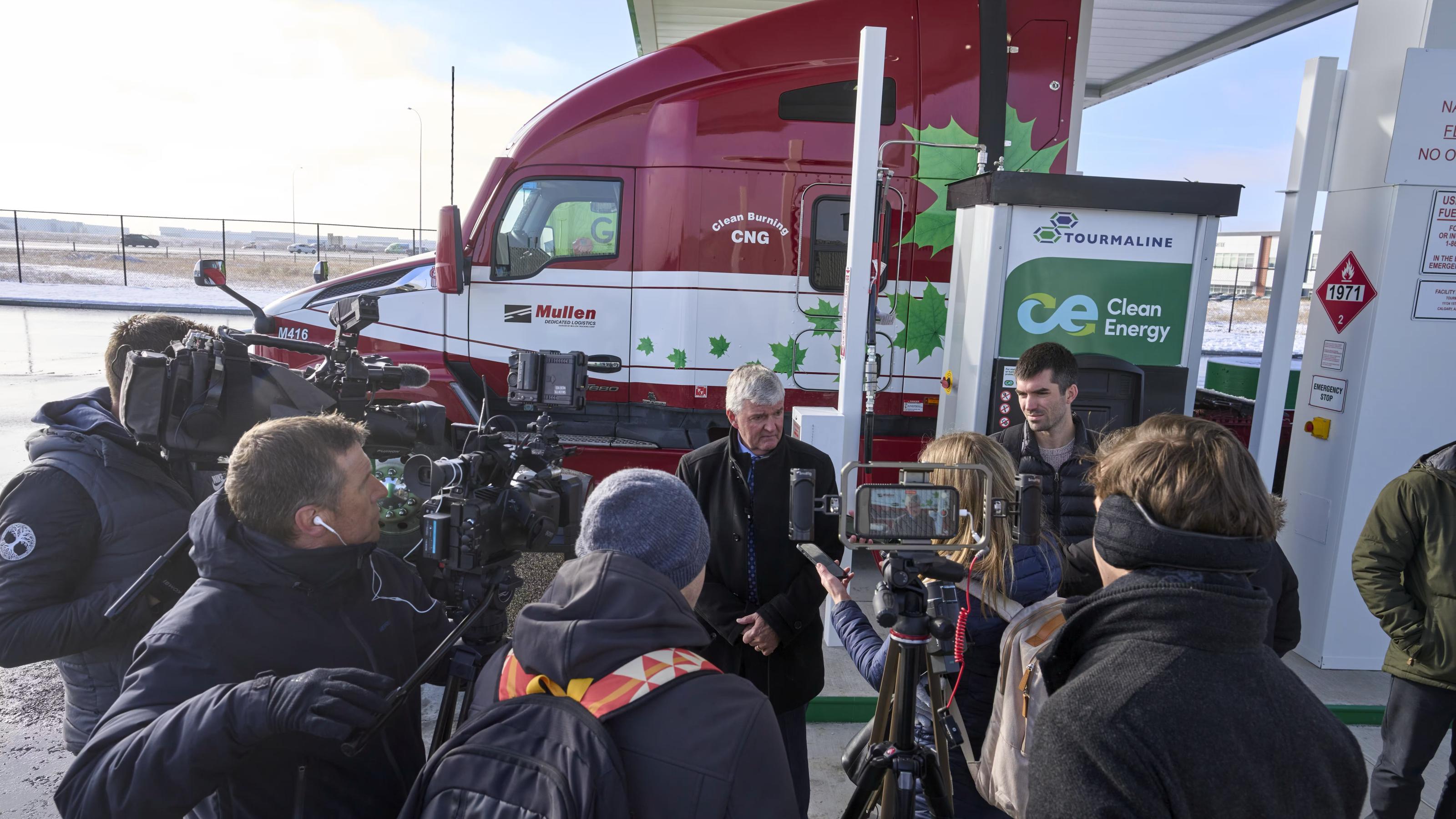Heavy-duty truckers hauling everything from restaurant supplies to specialized oilfield services along one of Western Canada’s busiest corridors now have more access to a fuel that can help reduce emissions and save costs.
Two new fuelling stations serving compressed natural gas (CNG) rather than diesel in Grande Prairie and Calgary, along with a stop that opened in Edmonton last year, create the first phase of what proponents call a “natural gas highway”.
“Compressed natural gas is viable, it’s competitive and it’s good for the environment,” said Murray Mullen, chair of Mullen Group, which operates more than 4,300 trucks and thousands of pieces of equipment supporting Western Canada’s energy industry.
Right now, the company is running 19 CNG units and plans to deploy another 15 as they become available.
“They’re running the highways right now and they’re performing exceptionally well,” Mullen said on Oct. 22 during the ribbon-cutting ceremony opening the new station on the northern edge of Calgary along Highway 2.
“Our people love them, our customers love them and I think it’s going to be the way for the future to be honest,” he said.

According to Natural Resources Canada, natural gas burns more cleanly than gasoline or diesel fuel, producing fewer toxic pollutants and greenhouse gas emissions that contribute to climate change.
The two new CNG stops are part of a $70 million partnership announced last year between major Canadian natural gas producer Tourmaline and California-based Clean Energy Fuels.
Their deal would see up to 20 new CNG stations built in Western Canada over the next five years, daily filling up to 3,000 natural gas-fueled trucks.
One of North America’s biggest trucking suppliers to businesses including McDonald’s, Pizza Hut, Subway and Popeye’s says the new stations will help as it expands its fleet of CNG-powered vehicles across Canada.
Amy Senter, global vice-president of sustainability with Illinois-based Martin Brower, said in a statement that using more CNG is critical to the company achieving its emissions reduction targets.
For Tourmaline, delivering CNG to heavy-duty truckers builds on its multi-year program to displace diesel in its operations, primarily by switching drilling equipment to run on natural gas.
Between 2018 and 2022, the company displaced the equivalent of 36 Olympic-sized swimming pools worth of diesel that didn’t get used, or the equivalent emissions of about 58,000 passenger vehicles.

Tourmaline CEO Mike Rose noted that the trucking sector switching fuel from diesel to natural gas is gaining momentum, notably in Asia.
A “small but growing” share of China’s trucking fleet moving to natural gas helped drive an 11 percent reduction in overall diesel consumption this June compared to the previous year, according to the latest data from the U.S. Energy Information Administration.
“China’s talking about 30 percent of the trucks sold going forward are to be CNG trucks, and it’s all about reducing emissions,” Rose said.
“It’s one global atmosphere. We’re going to reduce them here; they’re going to reduce them there and everybody’s a net winner.”
Switching from diesel to CNG is “extremely cost competitive” for trucking fleets, said Clean Energy CEO Andrew Littlefair.
“It will really move the big rigs that we need in Western Canada for the long distance and heavy loads,” he said.
Tourmaline and Clean Energy aim to have seven CNG fuelling stations operating by the end of 2025. Construction is set to begin in Kamloops, B.C., followed by Fort McMurray and Fort St. John.
“You’ll have that Western Canadian corridor, and then we’ll grow it from there,” Littlefair said.
The unaltered reproduction of this content is free of charge with attribution to the Canadian Energy Centre.
